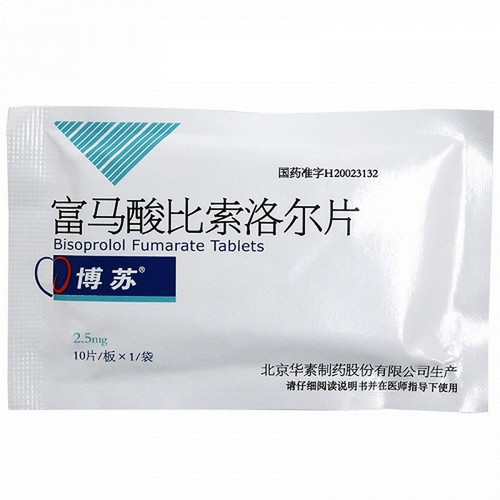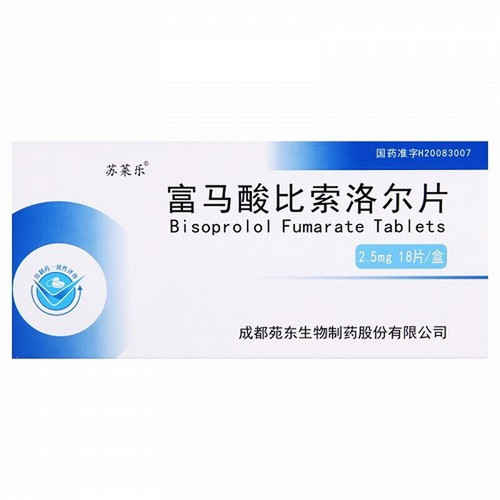Product Overview
[Drug Name]
Generic Name: Bisoprolol Fumarate Capsules
Trade Name: Luoya
English Name: Bisoprolol Fumarate Capsules
Chinese Pinyin: Fumasuan bisuoluo'er Jiaonang
[Ingredients]
Main ingredient and chemical name: 1-[4-[[2-(1-methylethoxy)-ethoxy]-methyl]-phenoxy]-3-[(1-methylethyl)amino]-2-propanol fumarate.
[Properties]
This product is a capsule containing white granules or powder.
[Indications]
For the treatment of hypertension, it can be used alone or in combination with other antihypertensive drugs.
[Dosage and Administration] This product should be used on an individualized basis. The usual initial dose is 5 mg orally once daily. Some patients may require an initial dose of 2.5 mg (e.g., for bronchospasm). If 5 mg is insufficient for antihypertensive efficacy, the dose can be increased to 10-20 mg. For patients with liver damage (hepatitis or cirrhosis) or renal impairment (creatinine clearance less than 40 ml/min), the initial dose is 2.5 mg daily. Caution should be exercised when increasing the dose.
[Adverse Reactions]
1. Hypersensitivity to this product. 2. Cardiogenic shock. 3. Hypotension. 4. Significant cardiac failure. 5. Sick sinus syndrome and clear sinus bradycardia. 6. Second- or third-degree atrioventricular block. 7. Bronchial asthma.
[Contraindications]
1. Hypersensitivity to this product. 2. Cardiogenic shock. 3. Hypotension. 4. Significant cardiac failure. 5. Sick sinus syndrome and clear sinus bradycardia. 6. Second- or third-degree atrioventricular block. 7. Bronchial asthma.
[Precautions]
1. In patients with renal or hepatic impairment, the dose of this product should be adjusted carefully. 2. Beta-blockers may inhibit myocardial contractility and exacerbate cardiac failure. Beta-blockers should be avoided in patients with severe cardiac failure. However, beta-blockers may be necessary for patients with compensated heart failure, but they should be started at a low dose and gradually increased to the clinically necessary dose. 3. Patients with no history of heart failure should be wary of the possibility that continued use of beta-blockers may induce heart failure. 4. If signs and symptoms of heart failure and/or worsening of heart failure occur, discontinuation of this drug should be considered. Patients who continue to use beta-blockers must also use other medications for the treatment of heart failure. 5. Abrupt discontinuation of beta-blockers may cause worsening of angina pectoris, myocardial infarction, or ventricular arrhythmias. Therefore, caution should be exercised when stopping or interrupting treatment with this drug without a doctor's advice. Patients are advised to gradually reduce the dose over approximately one week under close observation. 6. If this drug alone is used for pheochromocytoma and can cause a sudden increase in blood pressure, an alpha-blocker must be administered concurrently. 7. Beta-blockers can induce or worsen symptoms in patients with peripheral vascular disease and should be administered with extreme caution. 8. Patients with bronchospasm should generally not be treated with beta-blockers. Because this drug is a selective beta-1 blocker, it should be used with caution in patients with bronchospasm who are unresponsive to or intolerant of other antihypertensive treatments. The minimum initial dose is 2.5 mg. A beta-2 agonist (bronchodilator) should also be used as a backup. 9. Exercise extreme caution when using this drug continuously during the perioperative period or in combination with myocardial depressant anesthetics such as ether, cyclopropane, and trichloroethylene. 10. Beta-blockers may mask certain symptoms of hypoglycemia, such as tachycardia. This drug is a beta-1 selective beta-blocker and rarely causes the potential insulin-induced hypoglycemia and delayed blood glucose recovery seen with non-selective beta-blockers. However, patients with spontaneous hypoglycemia or those with diabetes receiving insulin or oral hypoglycemic medications should be aware of the potential for these conditions and use this drug with caution. 11. Beta-blockers may mask clinical symptoms of hyperthyroidism, such as tachycardia. Abrupt discontinuation of beta-blockers may worsen hyperthyroidism symptoms or lead to thyroid storm. 12. Patients with a history of severe allergies may experience anaphylactic reactions when using beta-blockers, and may not respond to conventional doses of epinephrine used to treat allergies.
[Drug Interactions]
1. This product should not be used in combination with other beta-blockers. 2. Combination with reserpine or guanethidine may increase its beta-blocking effect, leading to an excessive decrease in sympathetic activity. Close monitoring is recommended. 3. Patients receiving clonidine should discontinue this product several days before clonidine if medication is to be discontinued. 4. Caution is advised when using this product in combination with drugs with myocardial depressant or atrioventricular blocking effects, such as verapamil, diltiazem, and disopyramide, as additive effects may occur. 5. Reserpine increases the metabolism of this product and shortens its elimination half-life, but the initial dose does not require adjustment.
[Pharmacological Actions]
This product is a selective beta-1 adrenergic receptor blocker clinically used to lower blood pressure. Within the therapeutic dose range, this product has no significant membrane stabilizing or intrinsic sympathomimetic effects. At high doses (20 mg), it inhibits β2-adrenergic receptors (β2 receptors are primarily located in bronchial and vascular smooth muscle). It is four times more selective for β1 receptors than atenolol.
[Storage] Store tightly closed in a cool, dry place.
[Specification] 2.5 mg x 14 tablets
[Approval Number] National Medicine Standard H20000043
[Manufacturer] Beijing Langyi Pharmaceutical Co., Ltd.







